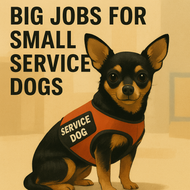Big Jobs for Small Service Dogs – Why Size Doesn’t Limit Ability
Posted by WorkingServiceDog on Jan 1st 2025
When most people picture a service dog, they think of large breeds like Labrador Retrievers, Golden Retrievers, or German Shepherds. While these big dogs are well-known for their work, the truth is small service dogs can perform many of the same life-changing tasks — and sometimes even have advantages over their larger counterparts.
The Americans with Disabilities Act (ADA) makes it clear — there are no weight or size restrictions for service animals. Whether your dog is 4 pounds or 200 pounds, if they are trained to perform specific tasks for a person with a disability, they are a legally recognized service dog. Unfortunately, small working dogs still face discrimination, but their abilities and benefits are undeniable.
Travel Advantages of Small Service Dogs
Small service dogs are often easier to travel with — especially when it comes to public transportation and air travel. On airplanes, a large service dog must fit on the floor between the passenger and the seat in front, which can be uncomfortable for both dog and handler. In contrast, petite service dogs can fit comfortably in tighter spaces and may even be permitted to sit on their handler’s lap.
Small dogs can also be safely crated during travel when using an airline-approved carrier that fits under the seat, giving both the handler and the dog a more comfortable journey.
Lower Costs for Handlers on a Budget
For individuals living on Social Security Disability (SSD) or a limited budget, the cost of caring for a dog can be a deciding factor. According to the ASPCA, feeding a small breed dog averages $580 per year, compared to approximately $875 annually for larger breeds. Over the lifetime of a service dog, that savings can really add up.
Tasks Small Service Dogs Can Perform
Small service dogs can be trained to perform many critical and even life-saving tasks, including:
Hearing Dogs
Small dogs trained as hearing service dogs can alert their handlers to important sounds such as a doorbell, phone ringing, fire alarm, or smoke detector. For individuals with hearing loss, this assistance is not just convenient — it can be lifesaving.
Seizure Alert Dogs
Some small dogs have the ability to detect the onset of a seizure before it happens. This alert gives their handler time to take safety measures, such as sitting down, placing a child in a safe location, or pulling over if driving. Seizure alert service dogs can reduce injury risk and provide critical support during and after an episode.
Changing Perceptions About Small Service Dogs
Education is helping to change outdated perceptions. More people are recognizing that service dogs of any size can provide invaluable assistance to individuals with disabilities. From hearing alerts to medical response, these small canine superheroes prove every day that it’s not the size of the dog that matters — it’s the size of their dedication.

